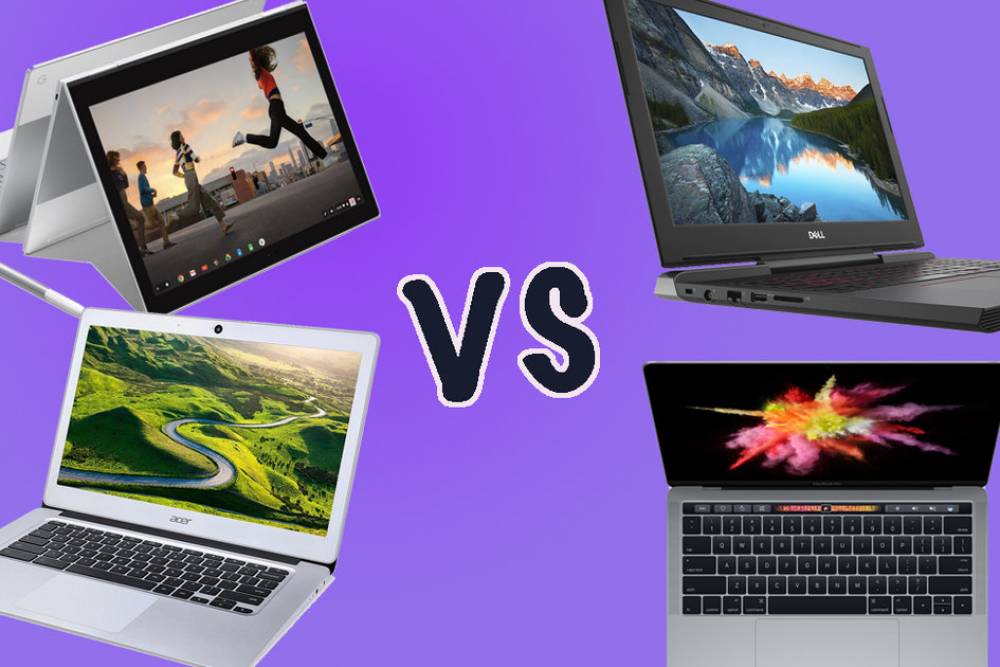
Chromebooks Vs. MacBooks Vs. Windows Laptops
Chromebooks vs. MacBooks vs. Windows laptops
If you're in the market for a new laptop, it's a good idea to do your research in advance. The laptop market is much more crowded than it was previously, with viable options available at every price point between $300 and $3,000. However, before you go overboard, you'll want to be certain you understand what you're looking for — and which features you can live without.
Finding the ideal laptop requires striking a balance of features such as screen size, processing power, and even the number of available ports. You'll also want to consider what you're willing to pay extra for; for instance, if you're going to be traveling with your laptop frequently, it's probably worth it to spend a little more on a thin-and-light model.
The first choice you'll have to make is between Google's ChromeOS, Apple's macOS, or Microsoft Windows. Here's the lowdown on each, as well as our favorite models.
What Is A Chromebook?
Chromebooks are laptops that run Google's ChromeOS, a web-browser-based operating system. While learning a new operating system may seem daunting, ChromeOS is essentially a browser with some local file storage built in, making it ideal for anything that can be done in a browser — which, let's face it, is pretty much everything.
How much does a Chromebook cost?
Chromebooks have a reputation for being low-cost, low-power machines—which is understandable, given that the majority of them are—but it is possible to find models that are fast enough to handle even the most demanding tasks.
In general, a Chromebook that costs less than $400 will be fast enough for schoolwork, web browsing, and the occasional streaming movie. Expect it to be a workhorse rather than a mountain mover, but count on it to get the job done. If you spend between $400 and $800 on a Chromebook, you'll get a very capable machine that's ideal for working from home and never feels slow. Chromebooks in this price range are overkill for most users, but are ideal for college students and work-from-home warriors. Chromebooks priced at $800 and above are designed for professionals who require increased processing power and screen resolution.
What Is A MacBook?
The MacBook laptops from Apple are among the most capable, usable, and expensive computers available. They run macOS, a traditional operating system that is renowned for its simplicity and ease of use. While MacBooks are capable laptops on their own, the real fun with Apple products is in their product synergy: MacBooks are designed to work natively with iPhones, AirPods, and even software services, enabling cross-platform functionality. For instance, if you own an iPhone, you can use a MacBook to make and receive phone calls seamlessly.
Although MacBook laptops are expensive, they are generally worth the investment because they are stable, last indefinitely, and retain their resale value.
MacBook Air vs. MacBook Pro
At the moment, the MacBook comes in two flavors: the MacBook Air, a thin-and-light model that established the standard for ultraportable laptops, and the MacBook Pro, a beefier laptop with more horsepower (and, if you're looking for it, a larger screen).
The MacBook Air is a one-size-fits-all model, whereas the MacBook Pro models feature faster CPUs and additional RAM, making them more suitable for students and professionals who work with demanding applications.
What Is A Windows Laptop?
Laptops running Windows have come a long way. Microsoft Windows 10 is the most refined version of the operating system to date, and it includes a feature called "Tablet Mode" that makes apps compatible with touchscreen devices.
Whether you've been a long-time Windows user or are brand new to it, Windows 10 is simple to learn and more stable than ever.
How to tell Windows laptops apart
With dozens of manufacturers producing Windows laptops, it can be difficult to determine which ones are worthwhile. Our general guidelines are as follows:
- Stick to well-known brands. You want reliable hardware, so avoid laptops from unknown manufacturers.
- Consider how much time you spend on your computer for work and how much time you spend on it for recreation. If you're purchasing a laptop for casual use, you don't need a powerful processor; an FHD (1080p) display will suffice. If you're purchasing a laptop for work that requires a lot of processing time or if you work in creative media, choose one with a faster CPU and a higher resolution screen. If you're looking for a laptop for more casual tasks, you can typically save a few hundred dollars.

